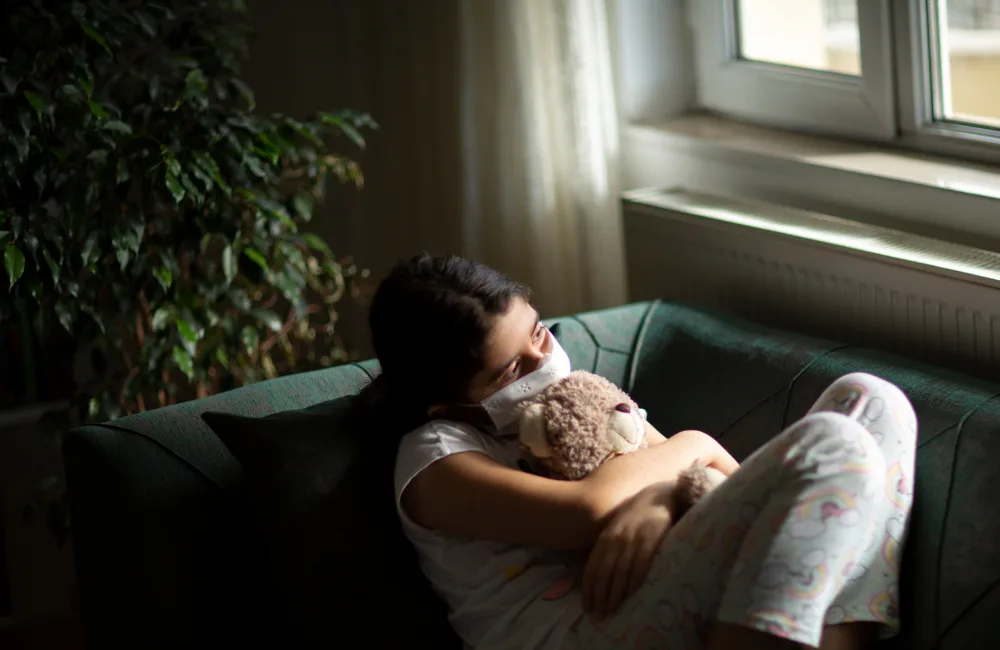
Photo credit: Canva
By using this site, you agree to our Terms of Use. This post may contain affiliate links. Read our disclosure policy.
Follow us on Instagram for creative ideas for kids.
Understanding signs of depression in children and how to deal with depression is key to helping your child as fast and efficiently as possible.
If you are a parent, the last thing you want to see is your child feeling sad or depressed. You may be wondering what signs of depression in children to look for and how to help them get through it. Below, we will talk about the most common signs of depression in children and what you can do if they start showing any of these symptoms.
What causes depression?
Depression in kids develops through a combination of genetic and psychological factors, so it’s important for parents to recognize any early warning signs. Depression in kids is due to a chemical imbalance in the brain, which is linked to low serotonin levels. This makes them feel sad or irritable for long periods of time, leading to a lack of motivation and sometimes disrupted sleep patterns.
Signs of depression
Depression has different symptoms, some children might show a change in their behavior by being irritable and hyperactive, while others may avoid their friends and family members, or they might have a change in sleeping habits. Below, you’ll find some warning signs to be aware of so that you know what to look for if you think your kid is depressed.
1. Overreacting or appetite loss
There are many ways you can notice depression in your young one, the most common behavior displayed with kids who have depression as well as other mental health issues is excessive eating or losing appetite entirely. If you notice your child eating more than usual or having no desire for food at all, they could be depressed.
2. Sleeping Disorder
Changes in sleeping patterns are another common sign of depression. A person may sleep for up to 12 hours a day, or they might have difficulty falling asleep at night or waking up during the morning hours. If you notice your child is struggling with their sleeping habits, this could indicate something more serious than just insomnia.
3. Lack of interest in favorite activities
A child who is depressed may lose interest in their favorite activities. If you notice your child not playing with friends or no longer participating in events they once loved, it could be a sign of depression.
4. Fatigue and lack of energy
Depression can cause a person to feel sluggish and constantly tired. If your child is always complaining about feeling fatigued or lacking energy, it could be due to depression.
If your kid was hyper and all of a sudden they seem very calm, this should raise concern.
5. Declining grades in schoolwork
A drop in grades can be a sign that something is wrong. If your child’s performance at school has lessened, it could be due to their emotions rather than lack of intelligence or skill. Depression could lead to your child not concentrating in class hence the drop in performance.
6. They’re irritable and easily frustrated
A depressed person may be easily frustrated and irritable. A child who is depressed might lash out more often than usual, or they could become upset over small incidents. If you notice your child acting in an unusual manner, it may indicate depression.
7. There’s a change in their personality
Personality change can be a sign that something is off. If your child’s demeanor has shifted and they’re no longer acting like themselves, it could indicate depression. In case your child used to be happy and outgoing but is now withdrawn and quiet, this could be a sign of depression.
8. Withdrawal from friends and family
A depressed person may feel alone and lost. If your kid is spending less time with friends or family, it could indicate their unhappiness. In addition to losing interest in hobbies, a child who used to enjoy the company of others might become distant from them altogether.
9. Showing signs of low self-esteem or self-worth
Self-doubt and self-criticism. Children who are depressed have a very low opinion of themselves which makes them talk down to themselves a lot. They can easily blame themselves for everything that goes wrong in life.
10. Feeling like hurting themselves or others
When a child is depressed, they tend to feel hopeless and want to hurt themselves or hurt others. Hurting others or themselves may be a result of thinking that nothing can be done about their current situation. As well, children who are depressed may have feelings of guilt or shame because they feel like they are the reason for all their problems.
11. Showing signs of anxiety
When someone is depressed, they tend to display anxiety. Depression is simply the opposite of happiness; it’s a feeling of sadness. People that are anxious tend to be more sensitive or emotional. You can notice anxiety when you talk to your child since they will not be comfortable having a conversation and they will prefer to keep it short.
12. Yelling at random times
Someone who is depressed may not have self-confidence, which would make them yell out their feelings for fear that no one will notice if they don’t stand up for themselves. Yelling can also be anger mixed with sadness since people who are depressed tend to be angry about things, too, without any reason at all.
If you observe the above symptoms, the most important step is to acknowledge that your child has a problem that needs immediate attention. Your support and care go a long way in helping them get better. When you notice any symptoms of depression in your child, it is time to talk about it with them frankly.
How to deal with your child’s depression
It will be easier if you are more open about your own emotions or mental health issues when talking with them for a start on a constructive note, even though talking about depression may seem hard for you.
When you have established a communication line between you and your depressed child, it is time to look for a solution; here are a few tips on how you can tackle depression.
Seek medical attention
If you suspect that your kid is displaying signs of depression, contact your pediatrician or family doctor. Discussing how they are feeling in an open and normal conversation, will help in diagnosing depression.
If necessary, the medical professional might refer you to a counselor or psychiatrist for further evaluation. Medication might be prescribed if there is evidence of clinical depression based on the diagnosis.
Change your child’s lifestyle
When your child is diagnosed with depression, you can aid them in a quick recovery by helping them change their lifestyle. Ensure that your kid exercises 30 minutes daily, eats a balanced diet and their sleeping patterns are normal that is they have plenty of sleep. By maintaining a healthy lifestyle, your child will change slowly with time, getting rid of the depression.
Open lines of communication
Talking through issues and emotions with children is important for their mental well-being. But kids don’t always know how to express what they are feeling, especially when it comes to depression.
Instead of asking them if they’re sad or ask why they seem so grumpy, just open the conversation by telling your child you’ve noticed something different about his behavior lately and that you want to find out how he’s really doing.
Provide a journal for them to scribe their feelings
Buy your child a diary where they will be writing down their mood; this will help them to express their emotions in a controlled way. Make sure they feel safe sharing the journal with you without fear of judgment.
If the journal is not an effective outlet for them, try other forms such as stickers or pictures that can be pasted over images. This may also provide children who do not prefer writing with another avenue for self-expression.
Find out what triggers these feelings in the child so you can be prepared for when they come up rather than being caught off guard by them if you can’t seem to prevent these feelings from occurring at all.
Work together on ways to approach any difficult situations until this becomes second nature for them. If the child is old enough, be open with them about what triggers these feelings in you as well. This way, they can understand that everyone has these feelings sometimes, and it’s okay.
Guidance and counseling
Counseling helps kids learn to communicate their feelings about difficult situations such as divorce. Kids also learn other skills such as anger management, problem-solving, and goal setting that can give them a sense of control thus tackling depression.
They may learn these skills during individual counseling or in a group session with other teens who have similar issues.
Depression is a serious condition that can be debilitating to anyone who suffers from it. If your child is suffering from depression, you can help them overcome and deal with these feelings by following the tips above and hopefully start living a normal life again.
Read more parenting articles:
Be the Parent You Needed When You Were Younger
